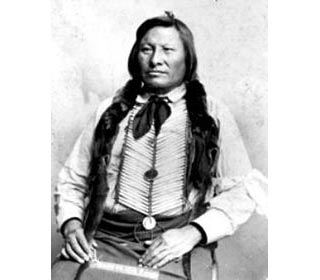The following fact sheet contains interesting facts, background history and information about the life of Rain in the Face and the events in history that led to his fame as a great Native American Indian leader. Fast Facts about Rain in the Face - Tribe: Hunkpapa Sioux
- Alternative name: Ito-na-gaju or Irogamaja
- Lifespan of Rain in the Face: 1835-1905
- Place of Birth: Near the Cheyenne River in North Dakota
- Date of Birth: 1835
- Date of Death: September 15, 1905
- Place of Death: Bullhead Station, Standing Rock Reservation
- Wars: The Sioux Wars (1854 - 1891), Red Cloud's War (1865–1868)
- Famous Battles: Battle of Little Bighorn
Rain in the Face - His Name
Rain in the Face’s birth name was Iromagaja. He was born in 1835 near the Cheyenne River in North Dakota, but he was not a Cheyenne Indian. He was a member of the Hunkpapa Sioux. The children in Hunkpapa Sioux became warriors at an early age, especially for those as competitive as Rain in the Face. His name was given to him when he beat a Cheyenne Indian, much older than him, in a fight. However, his Cheyenne opponent was able to strike him so much that blood streaked his face. The blood was washed away by rain - hence his name. Another version of his name's origin was when he fought the Gros Ventres. It was raining that day and the war paint that he wore streaked his face red and black and was washed away by the rain. As a point of interest War paint was used to intimidate enemies when going into battle. Red war paint symbolized war, blood, strength and power. Black war paint was a very aggressive color denoting strength and indicated that the wearer was a powerful warrior who had proved himself in battle. Rain in the Face - Red Cloud's War
He first fought against the whites during the Sioux Wars (1854 - 1891). Early in 1866 he participated in a raid against Fort Totten in what is now North Dakota. As a trusted and respected warrior Rain in the Face then fought with Chief Red Cloud in what became known as Red Cloud's War (1865–1868). Rain in the Face participated in the incident known as the Fetterman Massacre on December 21, 1866. Crazy Horse and Rain in the Face acted as decoy leaders helping to lure Lt. Colonel William J. Fetterman and 81 soldiers from Fort Phil Kearny into a trap. With 81 American fatalities, the Fetterman Massacre was the US army’s worst defeat in the West until the Battle of Little Bighorn in 1876 and spread terror amongst the white settlers. Rain in the Face - Battle of Honsinger Bluff
In 1867 the Sioux gave up a large section of territory and agreed to retire to the Standing Rock Reservation by 1876. in 1873 when Rain in the Face took part in the Battle of Honsinger Bluff. He then returned to the Standing Rock Reservation, but in 1874 he was arrested by Captain Thomas Custer for the murder of Honsinger. He was imprisoned in Fort Abraham Lincoln but escaped and fled to the Powder River. Rain in the Face - Battle of Little Bighorn
The gold rush in the Black Hills of Dakota sparked another rebellion under the leadership of the Sioux Chief Sitting Bull (c.1831–1890) Red Cloud, Crazy Horse and Chief Gall. In the spring of 1876, he joined Sitting Bull's band and in June 1876 traveled with him to the Little Big Horn River. These great Native Indian chiefs led the Sioux in the Battle of Little Bighorn against General George Armstrong Custer and the 7th Cavalry. During the Battle of Little Bighorn, Rain in the Face took revenge on Captain Thomas Custer. He killed his enemy and cut out his heart. Rain in the Face Surenders
The stunned and furious reaction to the US defeat at the Battle of Little Bighorn prompted a massive outcry and the US government flooded the area with troops, forcing the Native Indians to surrender or flee. Rain in the Face joined other Hunkpapa Sioux as they fled north into Canada. Rain in the Face spent several years in exile but finally led his band home and surrendered to the US in 1880. He was moved to the Standing Rock Agency in 1881. The Death of Rain in the Face
Rain-in-the-Face died on September 15, 1905 at his home at the Bullhead Station on the Standing Rock Reservation in North Dakota after a long illness. The Story of Rain in the Face
For additional facts and information refer to the legend and the Story of Rain in the Face. | 